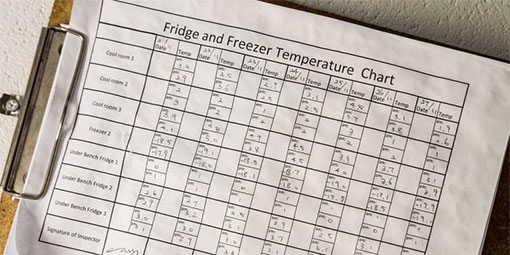In Australia, the introduction of Hazard Analysis Critical Control Point (HACCP) based Food Safety Programs across the broader food service sector occurred over a decade ago. These programs were designed as paper-based data collection and record management systems.
It has become clear that there are limitations with paper-based systems. The risks can also be high:
- it is employee intensive (and follow up by management)
- documentation errors
- legibility of data entered
- difficult and time-consuming record retrieval and reporting
- loss of records
- cost and space requirements for record storage
As I move around the food service sector (Aged & Health Care, Restaurants) there are too many operations relying on paper-based logs for managing their food safety system. Paper logs and production checks using clipboards are inefficient and ineffective in managing something as critical as food safety.
Collecting food safety data and stockpiling the paper logs for compliance purposes is simply not sufficient in preventing a food safety incident from occurring. It does require studying the data for improving processes and practices and developing a better system.
Let’s face it, in recent years the vast majority of food safety incidents in food service operations could have been prevented, only if, these operations relying on paper logs had used modern tools for collecting and analysing data.
As a manager or business owner, you need a robust system. You also need to demonstrate that you have taken all reasonable precautions. In doing so, this will go a long way in protecting your reputation and food operation and brand.
The way forward
Upgrading your operating technology so that your employees have digital tools is not expensive.
Modern cooking equipment has built in operating technology to assist in this regard.
Want to know more?
Join me and other high quality speakers in Adelaide on 25 May, at the Think ST Solutions Workshop Food & Hotel Services Risk. What Risk? for the Aged Care sector. For further information and registration click on the above link.
Not working in the Aged Care sector and want further information, contact me at info@thinkstsolutions.com.au
Image: Amanda Kelly Photography
Think ST Solutions offers you practical solutions at a management level and to your staff whether you operate in hospitals, aged care facilities, restaurants, hotels or the food industry generally. We specialise in developing useful tools to assist you in the areas of food safety, strategic planning, business management, risk and compliance training and easy to implement business consultancy solutions.

